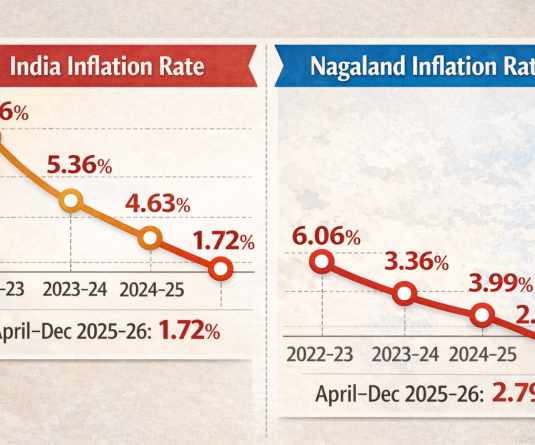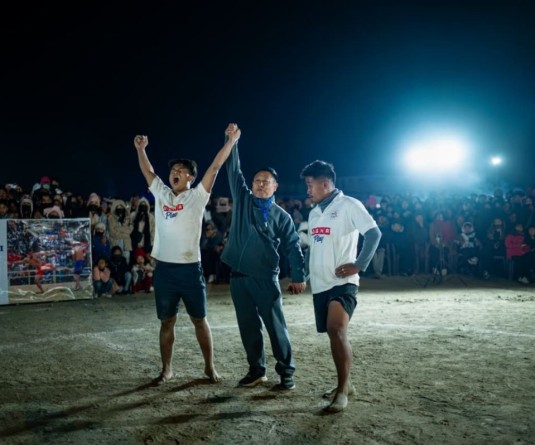
Al Ngullie
MOKOKCHUnG, December 5 (MExN): In her soaring voice, Sentimenla, a petite, attractive college student, traversed the anthem of the Watsu Mundang (Ao Women Hoho) in a powerful testimony of the spirit and struggle borne by Ao womenfolk in accomplishing and consolidating the place they are at now. Sung on an occasion such like the Miss Mokokchung 2005 pageant which was held at the Town Hall on November 28, organized by the Watsu Mundang under the standard, ‘Mystique’, it was an appropriate expression of the tumultuous journey taken thus far and the aspirations held in the heart for the future. The anthem, a melancholic surge of gratitude to the Almighty and the strength therein, bore witness to the sacrifice Ao women had to make to justify the journey from darkness to light; from primeval existence to modernity; from an uncertain then to an accomplished now. The song was a question of awe unto itself from where all that needed to accomplish the journey was provided for, amply. Thus, Mystique.
The journey will be seeing a milestone in 2007, when the Watsu would celebrate 25 years of existence under the banner ‘Revitalize’ culminating its vision for renewal. The journey began on April 23, 1982 when a group of women leaders from the Ao Baptist Church (ABTM) met to share ideas and deliberate on confronting issues that the church could not decidedly address. The resolve to ‘step in where the church could not step in’ led to the formation of the Watsu Mundang. From the inception, its influence grew in strength that by 1988 it became firmly established into the Ao community’s social system as a frontline, influential and decisive entity, consistent upon all exigencies and issues. Its prominence would lead them into critical areas encompassing demonstration of socio-political consciousness to socially-relevant initiatives left either unaddressed or denied.
The Mundang, for the last decades, has involved itself in myriad, socially-significant activities and programs evolving its aspirations alongside transitional trends for a society that would be easier on the common man. It has consistently focused on issues of education of the girl child, prohibition, communitisation and awareness programmes ranging from HIV/AIDS to welfare-surveys and issues of illegal immigrants. However, multi-faceted as its presence is, one of the areas the Mundang made its presence conspicuously decisive is in demonstration of political consciousness and assertion of citizenship. During the period of political upheaval prior to the ceasefire, the organization was responsible for drumming up effective public opinion to address excesses committed by military agencies as well as national workers, factional conflicts and likened political unrest within Mokokchung. The intervening period between 1999- 2003 characterized by factional conflicts for territorial control between various underground groups in the district, “consolidated the standing” of the Watsu Mundang for the reason that it was responsible for “doing what men could not” – taking out rallies and processions when the Ao Senden (Hoho) remained under suspension, warding off clashing cadres from the town etc. It is said that during those tumultuous years the Mundang was the only voice left for the people of Mokokchung, thereby breaking the fear psychosis of a people so long terrorized by dictates of killing, extortion, intimation and factional fights. According to Dr Chubatola Aier, President “We are there, if you (underground groups) are united” was the standard the Mundang stood on.
Relatively, it pushed for women empowerment. It perhaps is one of the first women organizations (if not the first,) in Nagaland to evolve a consensus for nomination of women members to the Town committee in the mid 80s. Since then, the trend has led to more concentration of action to facilitate the entry of women in diverse positions of political competence.
Considering its extensive socio-political pro-active participation, the Mundang, like any other pan-social entity too has had its share of incomprehension in regard to defining its actual role in specific areas of involvement. The Hoho, as of now has yet to devise and define a guiding system to direct its involvement in the society. “Although the Mundang (originally) filled in where there (was) a need, there is a need to evolve specific objectives to direct the Mundang” says Dr Aier implying that ‘indiscriminate’ involvement in issues, no matter how socially-relevant, were resisting the need to maintain consistency with the changing times. For this exigency the Silver Jubilee Year 2007 is envisaged as the occasion in retrospect to devise definitive objectives to consolidate its position and conform to the original aspirations of the Mundang ‘for a better Ao society’. And the first step towards the objective to conform its tradition-rooted values to the modern times was taken when the Watsu Mundang, for the first in the history of Naga women Hohos, undertook organizing a beauty pageant, Miss Mokokchung 2005 – an initiative many saw as counter-tradition yet perfectly apt with modern values.
The contestants reflected the aspirations the Mundang held. Miss Mokokchung 2005 Tiarenla, an effervescent secondary student, expressed strong feeling against crime perpetrated on women; 1st Runners-up winner Imnabenla told the judges spiritual awakening was the need of the hour; the 2nd Runners-up Sashinungla felt the need for more pro-active involvement of the whole community in general to address the issue of drug addiction and so on. Proving a stark contrast to hitherto fashionable statement to cite a celebrity as role models (read Mother Teresa), the contestants’ personal visions reflected the need to evolve constructive belief-systems. They expressed opinions in commonality with transformation, renewal and preservation of societal values manifested through the calling for benevolent initiatives to alleviate the suffering of society’s unfortunates; the personal dreams of the beauty queens proved a worthy affront to cultural degeneration in all its myriad forms. The pageant was a brave step which indicated the urgency to look at culture from all angles.
So come 2007, Silver Jubilee Year of the Mundang , Ao women will rediscover what Dr Chubatola Aier said of the woman as “the essence of mystique and what it holds in a women” in all its strength, resilience and aspiration that humankind ever stood to realize a truly progressive, untainted society. The theme testified to the inevitability of change and the relative difficulty to control the change-process. “The process is to change to mould and design modern concepts (consistent with traditional values) according to the needs of the changing times” Dr Chubatola Aier affirmed in her presidential address. It was not only an expression of a monumental truth far beyond the limits of mere participation of women in the society – it was an expression of a society’s desire for progressive systems through democratic objectives validated by democratic involvement.





